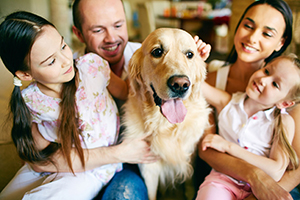Article by: Timothy J. Bupp, Esquire

When preparing a client’s estate planning, we try to anticipate every need and plan for every consideration in their lives. Such planning would be incomplete if it did not take into consideration the future care of animal pets. A recent study indicates that sixty-eight (68%) percent of American households, or about 85 million families, have animal pets. Pets provide love and companionship, and fulfill an important need in the family. It is only appropriate that care be given to the disposition of animal pets as part of your estate plan.
Puppynup. Animal pets can come into a marital union from either or both parties – but once a part of the family, the animal pet can love and affect both the parents and the children forever. Married couples should give early consideration to how their animal pets will be affected by the creation of – or dissolution – of their union. Courts in our federal jurisdiction have ruled that pets, while still considered property, have unique sentimental value that cannot be quantified with a price tag. A married couple can agree to a “puppynup” which will address shared possession of their pets in the event of divorce, which will be honored by a court. Where a married couple has not agreed to such terms, the court can make a determination ordering how an animal pet will be shared after divorce. A written agreement in advance always provides the most satisfactory solution.
The Pet Trust Act. Pennsylvania in its Trust Act has specifically provided for creation of trusts that will care for animal pets in a section on trusts for care of an animal (20 Pa.C.S.A. §7738). The code addresses how such trusts are created and terminated; how the trust can be enforced by a person interested in the welfare of the animal pet; and how a court can control funds in excess of the amount needed to care for the animal pet. Pet trusts can be created during the owner’s life, or set up as a provision of their Will. The pet trust law can aid a pet owner and their attorney in crafting the proper trust vehicle to meet the owners needs and desires, and to provide protection for animal pets now and in the future.
Consider tax effects. Care should be taken in creating such a trust, because moneys left in trust for a pet can be subject to the highest PA inheritance tax rate provided (15%). That was the result of a 2018 Chester County case where a $410,000 bequest to provide care for the decedent’s animals was taxed at the highest rate. However, in similar case in Westmoreland County in 2015, the court found that a $137,000 trust created to benefit six thoroughbred horses was not subject to tax, because the transferees were not personas, and the inheritance tax code anticipates that taxable beneficiaries should be people.
Obviously, professional advice and good planning should be utilized to provide security to the animal pet and peace of mind to its owners in a safe and efficient manner. If you have more questions, contact a CGA Law Firm estate law attorney today.

